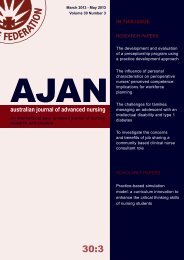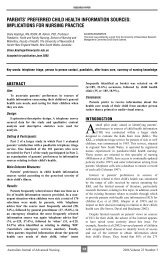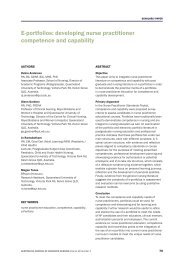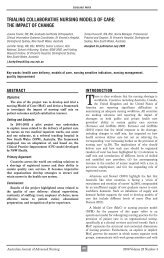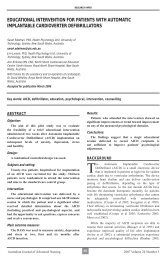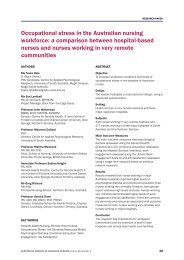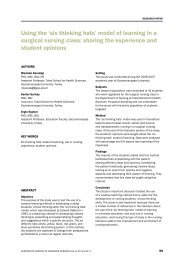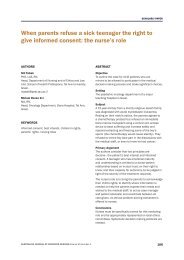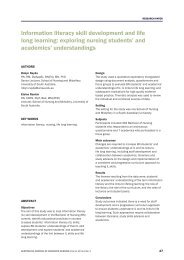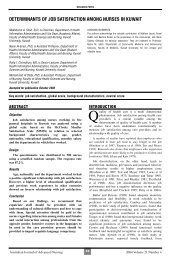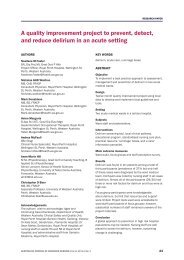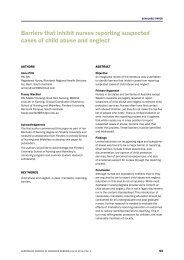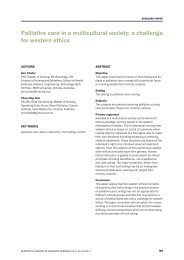AUSTRALIAN JOURNAL OF ADVANCED NURSING REVIEW PANEL: AUSTRALIA Jenny Abbey, RN, PhD, Queensland University <strong>of</strong> Technology, Kelvin Grove, Queensland Dr Alan Barnard, RN, BA, MA, PhD, Queensland University <strong>of</strong> Technology, Brisbane, Queensland Dr Cally Berryman, RN, PhD, Med, BAppSc, Grad Dip Community Health, Victoria University, Melbourne, Victoria Sally Borbasi, RN, Bed (Nsing), MA (Edu: Research), PhD, Griffith University, Meadowbrook, Queensland Cathy Boyle, The Prince Charles Hospital and Health District, Chermside, Queensland Carolyn Briggs, RN, CM, Dip. CHN, BA, MA, FRCNA, University <strong>of</strong> Technology, Sydney, New South Wales Julie Considine, RN, RM, BN, EmergCert, GDipNursAcuteCare, MNurs, PhD, FRCNA, Deakin University‑Northern Health Clinical Partnership, Victoria Dr Marie Cooke, RN, DAppSc (Nsg & Unit Management), BAppSc (Nsg), MSPD, PhD, Griffith University, Nathan, Queensland Mary Courtney, RN, BAdmin, MHP, PhD, FRCNA, AFCHSE, Queensland University <strong>of</strong> Technology, Brisbane, Queensland Trish Davidson, RN, ITC, BA, Med, PhD, Curtin University <strong>of</strong> Technology, Chippendale, New South Wales Tess Dellagiacoma, RN, BA, MA, NSW Department <strong>of</strong> Ageing, Disability and Home Care (DADHC), Sydney, New South Wales Dr Michelle Digiacomo, BA, MHlthSci (Hons), PhD, Curtin University <strong>of</strong> Technology, Chippendale, New South Wales Jim Donnelly, FRCNA, RMN, SRN, NDN, CertApprec.Obst.Care, ICU Cert, BAppScAdvNurs, MBA, Asset Management, Melbourne, Victoria Sandra Dunn, RN, PhD, FRCNA, Charles Darwin University, Casuarina, Northern Territory Trisha Dunning, RN, Med, PhD, FRCNA, Geelong Hospital, Victoria Dr David Evans, RN, PhD, University <strong>of</strong> South Australia, Adelaide, South Australia Jenny Fenwick, RN, PhD, Curtin University, Western Australia Ritin Fernandez, RN, MN(critical care), PhD Candidate, Sydney South West Area Health Service, Sydney, New South Wales Karen Francis, RN, PhD, MHLthSc, Nsg.Med, Grad Cert Uni Tech/Learn, BHlth Sc, Nsg, Dip Hlth Sc, Nsg, Monash University, Churchill, Victoria Dr Jenny Gamble, RN, RM, BN, MHlth, PhD, Griffith University, Meadowbrook, Queensland Deanne Gaskill, BAppSc (Nsg), GrDipHSc (Epi), MAppSc (HEd), Queensland University <strong>of</strong> Technology, Ash Grove, Queensland Dr Judith Godden, RN, PhD, BA(Hons), DipEd, University <strong>of</strong> Sydney, New South Wales Judith Gonda, RN, RM, BAppSci (AdvNursing‑Educ), MN, PhD, Australian Catholic University, Brisbane, Queensland Dr Jennene Greenhill, RN, PhD, MSPD, GradDipAppSc, RPN, BA, Flinders University, Adelaide, South Australia Rhonda Griffiths, RN, BEd (Nsg), MSc (Hons), PhD, University <strong>of</strong> Western Sydney, New South Wales Ruth Harper, BSc, RGN, MA, Royal Melbourne Hospital, Victoria Dr Ann Harrington, RN, BEd, MNg, Flinders University, Bedford Park, South Australia Kathleen Kilst<strong>of</strong>f, RN, BA, DipEd, MA, FCN, University <strong>of</strong> Technology, Sydney, New South Wales Virginia King, RN, MNA, BHA, BA, Southern Cross University, Lismore, New South Wales Dr Joy Lyneham, RN, BAppSci, GradCertEN, GradDipCP, MHSc, PhD, FRCNA, Monash University, Victoria Dr Sandra Mackay, RN, BN, PhD, Certificate in Sexual and Reproductive Health Nsg, Therapeutic Touch, Reiki Therapy, Charles Sturt University, Albury, New South Wales Dr Jeanne Madison, RN, MPH, PhD, University <strong>of</strong> New England, Armidale, New South Wales Elizabeth Manias, RN, BPharm, MPharm, MNursStud, PhD, CertCritCare, FRCNA, The University <strong>of</strong> Melbourne, Carlton, Victoria Peter Massey, RN, GradCertPublicHlth, MCN, Hunter New England Health, Tamworth, New South Wales Katya C May, RN, RM, CNM (Certified Nurse Midwife,USA), NP (Nurse Practitioner in Women’s Health,USA), MSN, BA, Gold Coast TAFE, Griffith University, Brisbane, Queensland Dr Jane Mills, RN, PhD, MN, BN, Grad.Cert.Tert. Teaching, Monash University, Churchill, New South Wales Anne McMurray, RN, BA (Psych), MEd, PhD, FRCNA, Murdoch University, Mandurah, Western Australia Wendy Moyle, RN, PhD, MHSc, BN, DipAppSci, Griffith University, Nathan, Queensland Dr Jane Neill, RN, BSc, PhD, Flinders University, Bedford Park, South Australia Marilyn Richardson-Tench, RN, PhD, ORCert, CertClinTeach, MEdSt, BAppSc (AdvNsg), RCNT (UK), Victoria University, Ferntree Gully, Victoria Dr Yenna Salamonson, RN, PhD, BSc, GradDipNsg(Ed), MA, University <strong>of</strong> Western Sydney, New South Wales Nick Santamaria, RN, RPN, BAppSc (AdvNsg), GradDipHlthEd, MEdSt, PhD, Curtin University <strong>of</strong> Technology, Western Australia Dr Winsome St John, RN, PhD, MNS, GradDipEd, BAppSc (Nsg), RM, MCHN, FRCNA, Griffith University, Gold Coast, Queensland Dr Lynnette Stockhausen, RN, DipTeach, Bed, MEdSt, PhD, Charles Sturt University, Bathurst, New South Wales Dr Chris Toye, RN, BN (Hons), PhD, GradCert(TertiaryTeaching), Edith Cowan University, Churchlands, Western Australia Thea van de Mortel, RN, BSc (Hons), MHSc, ICUCert, FCN, FRCNA, Southern Cross University, Lismore, New South Wales Sandra West, RN, CM, IntCareCert, BSc, PhD, University <strong>of</strong> Sydney, New South Wales Lesley Wilkes, RN, BSc(Hons), GradDipEd(Nurs), MHPEd, PhD, University <strong>of</strong> Western Sydney and Sydney West Area Health Service, New South Wales Dianne Wynaden, RN, RMHN, B.AppSC(Nursing Edu), MSc(HSc) PHD, Curtin University <strong>of</strong> Technology, Western Australia Patsy Yates, PhD, RN, FRCNA, Queensland University <strong>of</strong> Technology, Kelvin Grove, Queensland AUSTRALIAN JOURNAL OF ADVANCED NURSING REVIEW PANEL: INTERNATIONAL Dr Joy Bickley Asher, RN, RM, Teaching Cert (Sec), BA, Ophthalmic N Dip (Hons), PG Dip (Nurs), PG Dip (Soc), PhD, Research Advisor, Royal New Zealand Plunket Society, Wellington, Wellington, New Zealand Dr Robert Crouch, OBE, FRCN, Consultant Nurse, Emergency Department, Southampton General Hospital, University <strong>of</strong> Southampton, United Kingdom Yu-Mei (Yu) Chao, RN, PhD, MNEd, BSN, National Taiwan University, Taipe, Taiwan Desley Hegney, RN, CNNN, COHN, DNE, BA (Hons), PhD, FRCNA, FIAM, FCN (NSW), National University <strong>of</strong> Singapore, Singapore Jennifer Lillibridge, RN, MSN, PhD, MRCNA, Associate Pr<strong>of</strong>essor, California State University, Chico, California, USA Katherine Nelson, RN, PhD, Victoria University <strong>of</strong> Wellington, New Zealand Davina Porock, RN, BAppSc(Nsg), PGDip(Med‑Surg), MSc(Nsg) PhD(Nsg), Pr<strong>of</strong>essor <strong>of</strong> Nursing Practice, University <strong>of</strong> Nottingham, United Kingdom Vince Ramprogus, PhD, MSc, BA (Hons), RGN, RMN, Pro Vice Chancellor/ Dean <strong>of</strong> Faculty, Manchester Metropolitan University, Manchester, United Kingdom Colin Torrance, RN, BSc(Hon), PhD, Sport and Science University <strong>of</strong> Glamorgan Pontypridd, United Kingdom AUSTRALIAN JOURNAL OF ADVANCED NURSING Volume 26 Number 4 3
Health and the Global Financial Crisis GUEST EDITORIAL Gerardine (Ged) Kearney, Federal Secretary Australian Nursing Federation. Dominating social comment at the moment is the Global Financial Crisis or the GFC. Its dominance is <strong>of</strong> course only natural. It is a crisis <strong>of</strong> significant proportions. In Australia, like other countries, thousands have lost their jobs. Unemployment it is predicted will reach eight percent and billions <strong>of</strong> dollars <strong>of</strong> savings have simply disappeared. Government policy here, in response is centred on stimulating the economy. They have done this in two ways, by giving people money, which they hope they will spend and by investing in public infrastructure hopefully creating and saving jobs while investing in important things like schools, hospitals and roads. The jury is still out on whether or not this will be successful and s<strong>of</strong>ten the impact <strong>of</strong> the economic crisis. But I wanted to raise with you what the impact could be on health care, <strong>nursing</strong> and nurses. It has been said that health care and <strong>nursing</strong> are recession pro<strong>of</strong> industries because health care will continue to be needed. Indeed given that health is directly related to social determinants such as adequate income and well being our services may well be in even higher demand with people out <strong>of</strong> work and general stress regarding welfare. To an extent this is true. But the crisis is and will affect us. Governments are under pressure to make savings. Private health providers will be concerned about returns on investments. Aged care, already GUEST EDITORIAL under pressure and underfunded may well find less funding coming its way. Nurses working in aged care, who, in Australia are paid considerably less than nurses working in other sectors might, due to financial pressure, have to leave the sector to ensure a more adequate income elsewhere. We are already hearing <strong>of</strong> state governments in this country who want to freeze public sector wages and even renege on agreements. There is great temptation to strip resources from the costly health budget and that is worrying. As nurses and the largest workforce in health, we know that when governments or providers come looking for fat to cut in our hospitals, it usually comes from <strong>nursing</strong>. Unfortunately those areas that are seen as ‘fat’ are areas like research, education, or outreach programs like community liaison or public health care programs. They understandably leave as many clinicians at the bed side as they can, but if they had a little more vision and a better understanding <strong>of</strong> what makes a health society and what keeps people out <strong>of</strong> the hospital beds, we might actually emerge from this crisis with a healthier community and full c<strong>of</strong>fers as well. Cutting back on things like preventative health care programs, community outreach services etc ultimately will mean less healthy communities and a greater reliance on reactive health care which is expensive and just plainly poor social policy. Cutting back on educators and research means that we lose our most experienced nurses and <strong>of</strong>ten a commitment to quality and evidence gathering for effective proven health outcomes. Again, this means potentially more days spent in a hospital, more readmissions and sadly, a burnt out and disillusioned <strong>nursing</strong> workforce. AUSTRALIAN JOURNAL OF ADVANCED NURSING Volume 26 Number 4 4
- Page 1 and 2: June - August 2009 Volume 26 Number
- Page 3: AJAN australian journal of advanced
- Page 7 and 8: RESEARCH PAPER Living the experienc
- Page 9 and 10: such as, ‘tell me how you felt wh
- Page 11 and 12: more from it, to be able to cope wi
- Page 13 and 14: aware that how they responded to th
- Page 15 and 16: RESEARCH PAPER Verbal, physical and
- Page 17 and 18: Abuse is a universal problem, which
- Page 19 and 20: In the study, children working on t
- Page 21 and 22: 2009; Ali 2004; Baybuga 2002; Hadi
- Page 23 and 24: the street. The harsh conditions un
- Page 25 and 26: INTRODUCTION The concept of the sho
- Page 27 and 28: statistically significant with a p
- Page 29 and 30: REFERENCES Abenhaim, H.A., Kahn, S.
- Page 31 and 32: INTRODUCTION The concept of ‘spir
- Page 33 and 34: Table 1: Characteristics of partici
- Page 35 and 36: Spirituality propelled people into
- Page 37 and 38: Predictors of nurses’ commitment
- Page 39 and 40: care settings resulting in a major
- Page 41 and 42: facilities were around eight hundre
- Page 43 and 44: positively correlated with organisa
- Page 45 and 46: commitment and job satisfaction, pe
- Page 47 and 48: REFERENCES Al‑Aameri, A.S. 2000.
- Page 49 and 50: Wasti, S.A. 2002. Affective and con
- Page 51 and 52: INTRODUCTION Monitoring quality of
- Page 53 and 54: Presence of a clinical problem in a
- Page 55 and 56:
are from a possible range of 4‑20
- Page 57 and 58:
Limitations There were a number of
- Page 59 and 60:
Basic life support knowledge of und
- Page 61 and 62:
students enrolled in the undergradu
- Page 63 and 64:
different groups of health professi
- Page 65 and 66:
SCHOLARLY PAPER Nurse practitioners
- Page 67 and 68:
area health services failing to see
- Page 69 and 70:
close contact with a senior medical
- Page 71 and 72:
E-portfolios: developing nurse prac
- Page 73 and 74:
the candidate’s current role. Thi
- Page 75 and 76:
of the NP role and planning future
- Page 77 and 78:
Driessen, E., van der Vleuten, C.,
- Page 79 and 80:
INTRODUCTION Lifestyle behaviours h
- Page 81 and 82:
one couple thought it would not and
- Page 83 and 84:
Although four couples said that it
- Page 85 and 86:
state of mind and have suitable res
- Page 87 and 88:
Section 2 - Factors that may influe
- Page 89 and 90:
INTRODUCTION Pressure ulcers have t
- Page 91 and 92:
Song and Choi scale The Song and Ch
- Page 93 and 94:
study of a cardiac surgical unit an
- Page 95:
O’ Connell, B. and Myers, H. 2002



